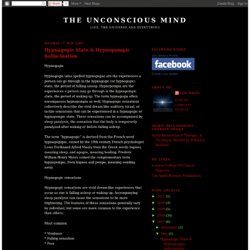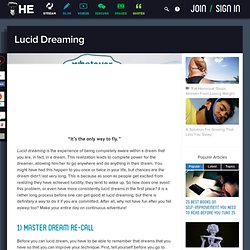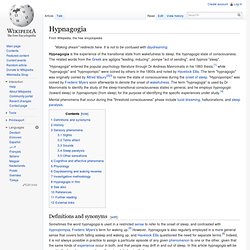

Hypnagogic State & Hypnopompic hallucination. Hypnagogia Hypnagogia (also spelled hypnogogia) are the experiences a person can go through in the hypnagogic (or hypnogogic) state, the period of falling asleep.

Hypnopompia are the experiences a person may go through in the hypnopompic state, the period of waking up. The term hypnagogia often encompasses hypnopompia as well. Hypnagogic sensations collectively describe the vivid dream-like auditory, visual, or tactile sensations that can be experienced in a hypnagogic or hypnopompic state. These sensations can be accompanied by sleep paralysis, the sensation that the body is temporarily paralyzed after waking or before falling asleep. The term “hypnagogic” is derived from the French word hypnagogique, coined by the 19th century French psychologist Louis Ferdinand Alfred Maury from the Greek words hupnos, meaning sleep, and agogos, meaning leading.
Hypnagogic sensations Hypnagogic sensations are vivid dream-like experiences that occur as one is falling asleep or waking up. Most common Rare. Lucid Dreaming. “It’s the only way to fly.”

Lucid dreaming is the experience of being completely aware within a dream that you are, in fact, in a dream. This realization leads to complete power for the dreamer, allowing him/her to go anywhere and do anything in their dream. You might have had this happen to you once or twice in your life, but chances are the dream didn’t last very long. This is because as soon as people get excited from realizing they have achieved lucidity, they tend to wake up. So how does one avoid this problem, or even have more consistently lucid dreams in the first place? 1) Master Dream Re-Call Before you can lucid dream, you have to be able to remember that dreams that you have so that you can improve your technique. Second, figure out your method for recording your dreams when you do remember them. 2) Carry Over Some Consciousness Pick a night when you are so tired that you will fall asleep as soon as you hit the bed…but don’t. 3) Reality Checks 4) Final Tips.
Scientific name for ability to see random stream of images? - psychology neurology imagination. Hypnagogia. Hypnagogia is the experience of the transitional state from wakefulness to sleep: the hypnagogic state of consciousness.

The related words from the Greek are agōgos "leading, inducing", pompe "act of sending", and hypnos "sleep". "Hypnagogia" entered the popular psychology literature through Dr Andreas Mavromatis in his 1983 thesis,[1] while "hypnagogic" and "hypnopompic" were coined by others in the 1800s and noted by Havelock Ellis. The term "hypnagogic" was originally coined by Alfred Maury[2][3] to name the state of consciousness during the onset of sleep. "Hypnopompic" was coined by Frederic Myers soon afterwards to denote the onset of wakefulness. The term "hypnagogia" is used by Dr Mavromatis to identify the study of the sleep-transitional consciousness states in general, and he employs hypnogogic (toward sleep) or hypnapompic (from sleep) for the purpose of identifying the specific experiences under study.[4] Definitions and synonyms[edit] History[edit] Sensory phenomena[edit]
Frequent "sleep paralysis" attacks - Sleep Disorders Message Board. It appears that people may be confusing "sleep paralysis" with one or more other disorders. 1.

"Sleep paralysis" generally refers to a condition wherein one's brain "wakes up" to general alertness yet most of one's *body* seems to be still asleep. During such states one may be able to hear, but generally can NOT open one's eyes or move. This is due to the different rates at which our brains (and parts therein) and other parts of our bodies mature developmentally.
It is very common - especially among boys - during the teens but generally ceases by the mid-twenties. 2. 3. 4. At any rate, any fully grown adult (past the early 20's for sure) who is experiencing ANY of these symptoms NEEDS to get a THOROUGH *medical* work-up FIRST, and then go to the proper specialist(s) from there if necessary.